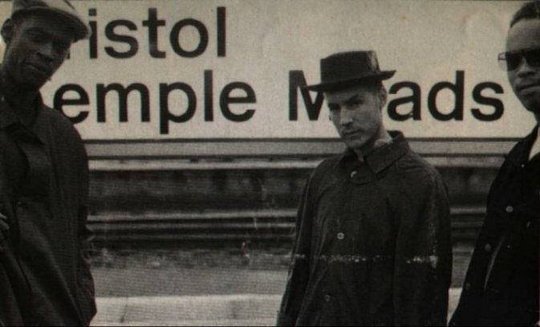
massive attack : formed 1988 in Bristol, England.
"If a thing's worth doing, it's worth doing slowly." Robert Del Naja

There were two distinctly British flavours of hip-hop in the mid-90s: jungle - the screaming, twisted, nine-million-bpm sound - and Massive Attack, whose music has picked up the make-do labels 'ambient hip-hop' and the rather catchier 'trip-hop'. Unlike rave and most rap music, the Massive sound admits to and explores an inner world, a much slower groove that finds and strokes your musical hot spots. You don't dance to Massive Attack: you sit, lay or sprawl, and you listen.

THE WILD BUNCH
Their history dates back to 1983 and the formation of the Wild Bunch, one of the earliest and most successful sound-system/DJ collectives to arrive on the U.K. music scene, together with Soul II Soul.
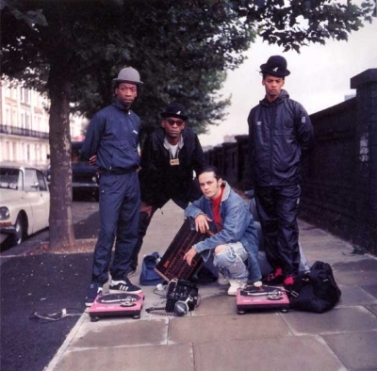 Inspired by Charlie Ahearn's pseudo-documentary of hip-hop culture Wild Style, Grant Marshall (aka Daddy G), Robert Del Naja (3D). Andrew Vowles (Mushroom), Nellee Hooper, Milo Johnson and Claude "Willie Wee" Williams formed the Bristol hip-hop collective The Wild Bunch. Accused by some of destroying the city's live music scene because of the popularity of their parties, The Wild Bunch would epitomise the sound (an agglomeration of hip-hop, rare groove, soul, reggae and rock influences) and organisation (loose affiliations of multi-media artists) of music groups in post-hip-hop Britain despite releasing only one single during their five-year lifespan, "Friends and Countrymen/The Look of Love" (1987). Renowned for their seamless integration of a wide range of musical styles, from punk to reggae to R&B, the group's parties quickly became can't-miss events for the Bristol club crowd, and at the peak of their popularity they drew crowds so enormous that the local live music scene essentially ground to a halt.
Inspired by Charlie Ahearn's pseudo-documentary of hip-hop culture Wild Style, Grant Marshall (aka Daddy G), Robert Del Naja (3D). Andrew Vowles (Mushroom), Nellee Hooper, Milo Johnson and Claude "Willie Wee" Williams formed the Bristol hip-hop collective The Wild Bunch. Accused by some of destroying the city's live music scene because of the popularity of their parties, The Wild Bunch would epitomise the sound (an agglomeration of hip-hop, rare groove, soul, reggae and rock influences) and organisation (loose affiliations of multi-media artists) of music groups in post-hip-hop Britain despite releasing only one single during their five-year lifespan, "Friends and Countrymen/The Look of Love" (1987). Renowned for their seamless integration of a wide range of musical styles, from punk to reggae to R&B, the group's parties quickly became can't-miss events for the Bristol club crowd, and at the peak of their popularity they drew crowds so enormous that the local live music scene essentially ground to a halt.
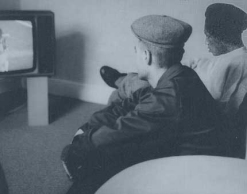 While the Wild Bunch are largely myth and legend to those who lived outside Bristol, their legacy lives on in the group that grew out of the collective.
While the Wild Bunch are largely myth and legend to those who lived outside Bristol, their legacy lives on in the group that grew out of the collective.
MASSIVE ATTACK
The pioneering force behind the rise of trip-hop, Massive Attack were among the most innovative and influential groups of their generation; their hypnotic sound - a darkly sensual and cinematic fusion of hip-hop rhythms, soulful melodies, dub grooves, and choice samples - set the pace for much of the dance music to emerge throughout the 1990s, paving the way for such acclaimed artists as Portishead and Tricky, himself a Massive Attack graduate.
BLUE LINES
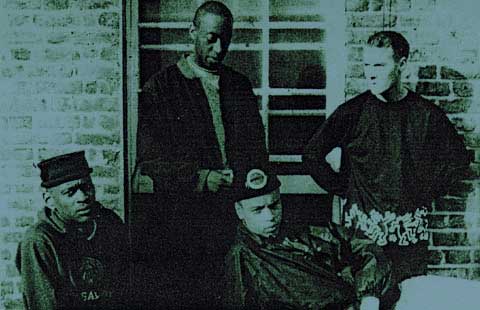 Massive Attack formed in 1987 after the break-up of The Wild Bunch, with a core of Daddy G, 3D and Mushroom - Wild Bunch alum, Nellee Hooper, split his time between the new group and his other project, Soul II Soul. They released a cover of Chaka Khan's "Any Love" featuring Carlton, which was produced by fellow Bristolians Smith and Mighty. Their real calling card, however, was 1990s "Daydreaming". With Tricky and 3D quoting Fiddler on the Roof and The Beatles while floating on a stream-of-consciousness detachment, background inhalations and exhalations, creeping bpms and Shara Nelson's blues whispers, "Daydreaming" was all about the doped-out headspace that results from "living in my headphones". Backed with Larry Heard's gorgeous remix of "Any Love", the single heralded the arrival of "the Bristol sound" and presaged the development of Trip-Hop.
Massive Attack formed in 1987 after the break-up of The Wild Bunch, with a core of Daddy G, 3D and Mushroom - Wild Bunch alum, Nellee Hooper, split his time between the new group and his other project, Soul II Soul. They released a cover of Chaka Khan's "Any Love" featuring Carlton, which was produced by fellow Bristolians Smith and Mighty. Their real calling card, however, was 1990s "Daydreaming". With Tricky and 3D quoting Fiddler on the Roof and The Beatles while floating on a stream-of-consciousness detachment, background inhalations and exhalations, creeping bpms and Shara Nelson's blues whispers, "Daydreaming" was all about the doped-out headspace that results from "living in my headphones". Backed with Larry Heard's gorgeous remix of "Any Love", the single heralded the arrival of "the Bristol sound" and presaged the development of Trip-Hop.
The classic and magnificent "Unfinished Sympathy" followed, , which bobbed around at the deep end of the Top 40, as did another compelling effort, "Safe From Harm." According to polls produced by MTV2, NME, and various other magazines and reviewers, "Unfinished Sympathy" has been described as one of the best songs of all time. A reviewer for the BBC has stated: "More than a decade after its release it remains one of the most moving pieces of dance music ever, able to soften hearts and excite minds just as keenly as a ballad by Bacharach or a melody by McCartney."
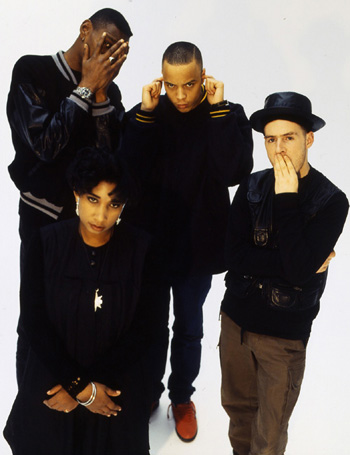 Finally, in 1991 Massive Attack issued their debut LP, Blue Lines; while by no means a huge commercial success, the record was met with major critical praise, and was dubbed an instant classic in many quarters. It was quite simply epochal and commanded respect and attention.
Finally, in 1991 Massive Attack issued their debut LP, Blue Lines; while by no means a huge commercial success, the record was met with major critical praise, and was dubbed an instant classic in many quarters. It was quite simply epochal and commanded respect and attention.
Incorporating Bristol's laconic take on hip-hop, reggae vocalist Horace Andy, the jazz-fusion of Billy Cobham, the James Brownian motion of funk, symphonic '70s soul and the "death disco" of Public Image Limited, Blue Lines was the first representation of a certain kind of syncretic Britishness that would define the island's music for the next decade. Just as The Rolling Stones and Led Zeppelin re-read African-American blues as the soundtrack for the sexual liberation of Swinging London. Massive Attack reworked the ganja crawl of reggae and bloodshot atmospheres of hip-hop as the sound of post-Thatcher disengagement from society: "There's no sunshine in my life because the way I deal is hazy"; "Are you predatory? Do you fear me?"; "Just be thankful for what you got"; "Excommunicated from the brother-hood of man". With its hard urban lyrics and hypnotic beats, dusted with samples from all your favourite songs and wrapped up in a smooth production job, it became audio accessory of the year. Probably the best, certainly the most important album of the decade. Blue Lines defined the sound of Britain's carcass after Thatcher had finished with it.
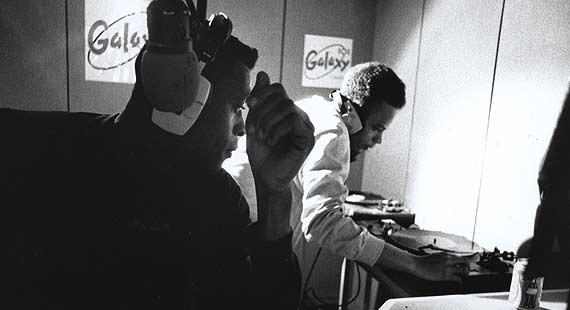
Blue Lines subsequently became one of the most influential British records of the 1990s, inspiring other projects such as Portishead and plagiarists like Morcheeba. Blue Lines ushered in a new genre of music best referred to as "the Bristol sound", but the press began to use the repulsive label "trip hop", which the members of Massive Attack dislike.
Nelson, whose smoking, powerful voice was Massive's most immediate hook, featured on many of the album's most memorable tracks, exited for a solo career soon after. It would have been so easy to write off Massive Attack as another good act dying young. Losing a manager and a co-producer was a further carelessness, and changing the name of the band just when things were beginning to take off might have been thought unwise.
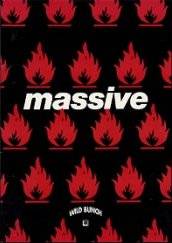 'Massive', a new handle, was apparently chosen to avoid any implication of support for the United Nations' policy towards the Iraqi government (Bomb the Bass did something similar). However during the first Gulf War, several British media channels became anxious to avoid using words suggestive of war and violence, and Massive Attack (then struggling to become established) were forced to temporarily change their name. Robert Del Naja makes no secret in interviews of his political objections to what he sees as U.S. aggression against the Third World in the name of democracy, often expressing regret that he ever agreed to the name change.
'Massive', a new handle, was apparently chosen to avoid any implication of support for the United Nations' policy towards the Iraqi government (Bomb the Bass did something similar). However during the first Gulf War, several British media channels became anxious to avoid using words suggestive of war and violence, and Massive Attack (then struggling to become established) were forced to temporarily change their name. Robert Del Naja makes no secret in interviews of his political objections to what he sees as U.S. aggression against the Third World in the name of democracy, often expressing regret that he ever agreed to the name change.
They then crowned all this with a fairly disastrous attempt to conquer US stadiums with a club-scale sound. It's easy to see why there was a three-year gap between recordings; in the wake of that disastrous U.S. tour that, many were quick to write the band off right then and there.
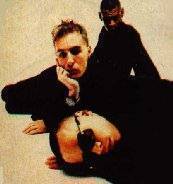 When The Massive Attack EP (1992) was released, the one new track, "Home of the Whale", featured vocals from Caroline Lavelle. With Tom-Waits-produced-by-Danny-Elfman music and the ethereal, almost folk vocals, "Home of the Whale" prefigured the direction that Massive Attack would take on their next two records.
When The Massive Attack EP (1992) was released, the one new track, "Home of the Whale", featured vocals from Caroline Lavelle. With Tom-Waits-produced-by-Danny-Elfman music and the ethereal, almost folk vocals, "Home of the Whale" prefigured the direction that Massive Attack would take on their next two records.
PROTECTION
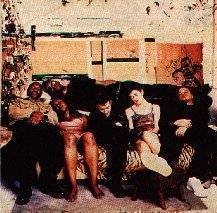 After a three-year layoff, Massive Attack - their full name now properly reinstated - resurfaced with seductive masterpiece, Protection. A spell of 'Bristol time' and a copious amount of spliffs on from Blue Lines gave Massive's sound a chance to grow up a little. Protection was released to much fanfare and saw their music pinned down to the 90bpm region - that sparsely populated area between reggae and hip-hop - and beaten gently into shape by their old Wild Bunch pal Nellee Hooper (1995's most wanted producer since his work with Soul II Soul and Bjork). There was less sampling and a wider range of guest vocalists, star of the show being the remarkable Nicolette, whose school-of-Billie-Holiday voice is so fragile and beautiful that it seems dangerous to breathe when she sings (her lost treasure of an album, Now Is Early, recorded with Shut Up and Dance, is a collection of torch songs to tear your heart out). Further stand-out contributions came from surprise team-member Tracy Thorn of Everything but the Girl, whose bittersweet and stunning vocals let rip on the gorgeous title track, and the vintage reggae voice of Horace Andy, whose "Spyinglass" brought in a refreshing burst of paranoia.
After a three-year layoff, Massive Attack - their full name now properly reinstated - resurfaced with seductive masterpiece, Protection. A spell of 'Bristol time' and a copious amount of spliffs on from Blue Lines gave Massive's sound a chance to grow up a little. Protection was released to much fanfare and saw their music pinned down to the 90bpm region - that sparsely populated area between reggae and hip-hop - and beaten gently into shape by their old Wild Bunch pal Nellee Hooper (1995's most wanted producer since his work with Soul II Soul and Bjork). There was less sampling and a wider range of guest vocalists, star of the show being the remarkable Nicolette, whose school-of-Billie-Holiday voice is so fragile and beautiful that it seems dangerous to breathe when she sings (her lost treasure of an album, Now Is Early, recorded with Shut Up and Dance, is a collection of torch songs to tear your heart out). Further stand-out contributions came from surprise team-member Tracy Thorn of Everything but the Girl, whose bittersweet and stunning vocals let rip on the gorgeous title track, and the vintage reggae voice of Horace Andy, whose "Spyinglass" brought in a refreshing burst of paranoia.
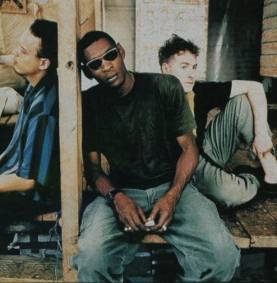 The album was a further retreat into an inner space with marijuana fog - featuring two string instrumentals arranged by Craig Armstrong, this album featured a more lush, deeper sound than the first. This marked the last collaboration of Wild Bunch member Tricky with Massive Attack, as he afterwards concentrated wholly on his solo career. Three singles - "Karmacoma," "Sly," and the title track - were released from the LP.
The album was a further retreat into an inner space with marijuana fog - featuring two string instrumentals arranged by Craig Armstrong, this album featured a more lush, deeper sound than the first. This marked the last collaboration of Wild Bunch member Tricky with Massive Attack, as he afterwards concentrated wholly on his solo career. Three singles - "Karmacoma," "Sly," and the title track - were released from the LP.
Despite being beaten at their own game by neighbours Portishead and exile Tricky, the album was received rapturously and led to them working with Madonna on her cover of Marvin Gaye's "I Want You" for a Marvin Gaye tribute album, "Inner City Blues. They were allegedly so terrified of meeting her that they hid. Over the next several years, Massive Attack's solo work was augmented by several remixes for artists including Garbage and U2.
In late 1994 Massive Attack went on tour in the UK. They took acetate pressings of the various tracks on Protection with them, together with some of the Wild Bunch crew, packed each venue full with enormous speakers and mood-altering lights, and did the album live. People came, inhaled and fell over, beaten down to the ground by a bass that turned your knees liquid.
South London's own Mad Professor reggae producer came along on certain dates and constructed a dub strong enough to fly off the turntable. Although the album was already wrapped in a cloud of bass and a patina of rust, dub producer Mad Professor mixed the album into a vortex of quicksand gravity on his dub version of the album, No Protection (1994). His dub mix was an awesome, bass-heavy brew, dressed up with Ariwa Studio's Sunday-best technology.
The band's appearances at UK Summer festivals were celebratory and extraordinarily effective (for example, having a curtain fall away to reveal a full orchestra at the climax of "Unfinished Sympathy"). World tours took them far from home and ultimately had an influence on the music.
To promote their appearance at the annual Glastonbury music festival, the group issued a new EP, during the summer of 1997. "Risingson" (1997) heralded their third album with an edgy, discomfiting, guitar-led sound.
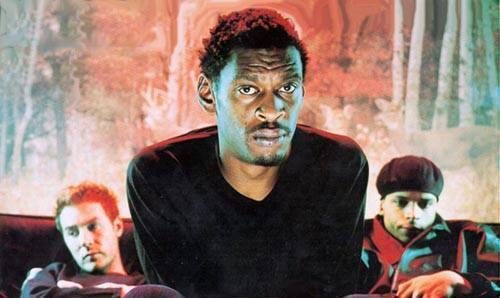
The third full-length Massive Attack effort, Mezzanine, appeared in mid-1998; in addition to reggae singer Horace Andy, making his third consecutive LP appearance with the group, vocal chores were handled by the Cocteau Twins' Elizabeth Fraser and newcomer Sara Jay.
Massive Attack's third album Mezzanine was released in 1998. Mezzanine showed the band moving towards a dark, distorted guitar-based sound, and, according to many fans and critics, marked a significant evolution. Several songs from this album have been featured in major motion pictures; the opening track, "Angel", appears in the films Snatch (directed by Guy Ritchie), GO (directed by Doug Liman), Flight of the Phoenix, and Pi (directed by Darren Aronofsky), and in an episode of television series The West Wing. The fourth track, "Inertia Creeps" is used in Stigmata. The sixth track, "Dissolved Girl" was featured in the films The Matrix and The Jackal. The Japanese release of Mezzanine featured an additional track, "Superpredators", which was also used as the opening theme to the film The Jackal. The third track, "Teardrop", is the opening theme (in instrumental form) for the television series House. "Teardrop" has also been used in the television series La Femme Nikita in the late 90's; and in a 2006 episode ("Sanctuary") of the television series Cold Case, the piece signifies a flashback to 1998. Although part of their song "Teardrop" is being used as the theme music on House, M.D. in the US, versions of the program aired in other countries, such as the UK, use a generic snippet of music that resembles "Teardrop". Part of their song "Angel" is being used as the theme music for another American television series, 24.
Mezzanine, was pure darkness, all jagged edges, morose textures and brooding menace. The only respites were the tracks featuring singer Elizabeth Fraser of recently-defunct Cocteau Twins fame (Grant remembers selling copies of their Pearly Dewdrops EP when he worked in Bristol's' Revolver record shop), whose airy vocals brought a vague sense of peace to the gothic Sturm and Drang of the album. Horace Andy was still on board, providing the voice of bitter experience and the female vocal side of things was jointly held up by Liz Fraser and Sara Jay. The music reflected the make-do attitude of the experienced gigging band, with raw guitar sounds being blended into the smooth mix of samples. The round of promotional interviews was peppered with references to hotels, world travel and the difficulties in connecting with one another any longer. The three breakdancing funsters that were the Wild Bunch had grown older, wiser and perhaps a little more serious.
Mezzanine nearly caused the band to split during its prolonged and painful recording and it was the sound of a comedown. When the highpoint was as saturnine as Blue Lines, Mezzanine was a long way down.
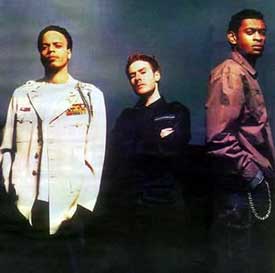 Mezzanine became a cult hit among critics, clubs, and the college crowds, spinning successful singles such as "Teardrop" and "Inertia Creeps. The release also led to a remarkable evolution in the Massive Attack live show. Moving on from the highly simplistic set up of a few mics and turntables, the group had gradually begun incorporating more and more live instrumentation into their shows. As well as the impressive roster of guest vocalists, the Bristol trio were now being joined on stage by the talents of a live guitarist, bassist , drummer and keyboard player.
Mezzanine became a cult hit among critics, clubs, and the college crowds, spinning successful singles such as "Teardrop" and "Inertia Creeps. The release also led to a remarkable evolution in the Massive Attack live show. Moving on from the highly simplistic set up of a few mics and turntables, the group had gradually begun incorporating more and more live instrumentation into their shows. As well as the impressive roster of guest vocalists, the Bristol trio were now being joined on stage by the talents of a live guitarist, bassist , drummer and keyboard player.
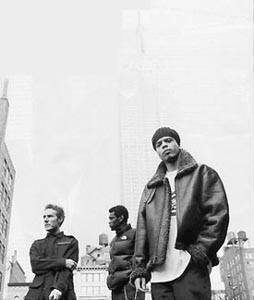
A tour of America and Europe followed, but Vowles left the band after disagreeing with the artistic direction of Mezzanine. Del Naja and Marshall continued as a duo, later working with the likes of David Bowie and the Dandy Warhols, but Marshall later took a leave of absence to raise his family; producer Neil Davidge took up the slack worked in tandem with Del Naja for much of his new material. Marshall elected to sit out during the recording of 100th Window.
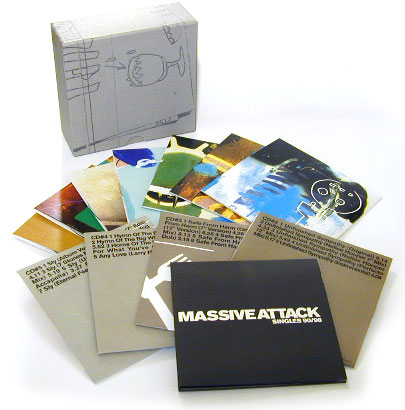
An eleven-CD collection of their past singles and remixes wrapped in heat-sensitive packaging, the Singles Collection (1999) was meant to prove that they were the most important British band of the '90s, but its almost mercenary capitalism left a sour taste.
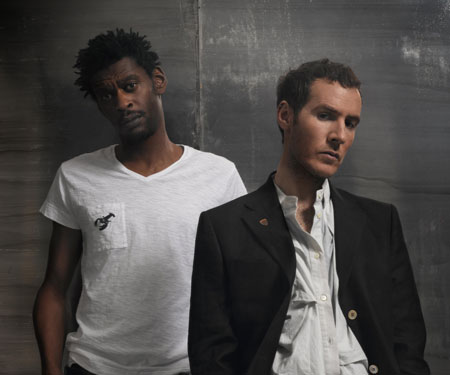
In February 2003, after a five-year wait, Massive Attack released their fourth album, 100th Window, including collaborations with mainstay Horace Andy as well as Sinéad O'Connor. It entered the Top 10 in the UK charts. Del Naja was charged with possession of drugs that month. While some critics found 100th Window album not up to par with previous offerings, many found it a worthwhile listening experience.
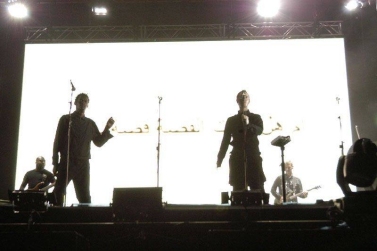
The 100th Window world tour saw some world class lighting and a breathtakingly huge visual screen, which raised the bar once again seeing Massive Attack become one of the biggest live shows the world has ever seen.
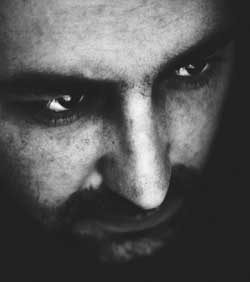 In 2004, the band, now consisting of Del Naja, Davidge, and programmer Alex Swift, released an instrumental soundtrack for the feature film Danny the Dog, which was produced by Luc Besson. The film's title was changed to Unleashed prior to the American release, though the album was initially released under the original title as it came out months before the film.
In 2004, the band, now consisting of Del Naja, Davidge, and programmer Alex Swift, released an instrumental soundtrack for the feature film Danny the Dog, which was produced by Luc Besson. The film's title was changed to Unleashed prior to the American release, though the album was initially released under the original title as it came out months before the film.
2005 saw the band contribute to the soundtrack for the feature film Bullet Boy. The group had also been slated to work on music for the film adaptation of V For Vendetta with past collaborator Craig Armstrong, but had to bow out of the project due to scheduling problems.
The groups first greatest hits package was released early in 2006 and featured "Live With Me", boasting the immensely powerful vocals of Chicago folk legend Terry Callier, the new song "Live With Me" sees the group moving in yet another new direction.
Del Naja, Davidge and Swift are now in the studio working on their next release, tentatively titled Weather Underground. Dot Allison, Horace Andy, Mike Patton and Mos Def are expected to be vocal contributors.
Massive Attack make Long Dark Night of the Soul Music, a coming-together of funk and dub reggae, tinged with the attitude that created punk in the 70s. They've taken all the cool sounds that you love and have re-processed them for your listening pleasure. They hand-craft their sound without being masters of any of the traditional musical instruments, working instead by selecting from the 'riff-bank' they've created over the years. The corporate money, boosted by enormous worldwide album and ticket sales, is rolling in. Taken together, all this ought to result in spiritless, mechanical recordings. It doesn't.
Massive Attack originally consisted of three members, Robert Del Naja ("3D"), Grant Marshall ("Daddy G") and Andrew Vowles ("Mushroom").
Each Massive Attack album features guest vocalists, and so far the band has worked with Mos Def, Tricky, Shara Nelson, Tracey Thorn of Everything But The Girl, Nicolette, Sara Jay, Elizabeth Fraser of Cocteau Twins and Sinéad O'Connor. The Jamaican reggae legend Horace Andy is a fixture of Massive Attack albums.
Massive Attack now currently own their own bar, subtly named 'Nocturne'. It features ambient lighting, exquisite seating and furniture arrangements and a state of the art sound system that exists only in one other location in the world. This is an exclusive bar, which is notoriously well known as being a strictly members only club, but from time to time the owners have been known to allow certain people inside anyway. One can actually hire the venue out for receptions or parties, but it is very expensive, which is to be expected as it frequently described and factually said to be one of the best bars in the world. It is located in one of Bristol's major high streets, and has its own interactive website.
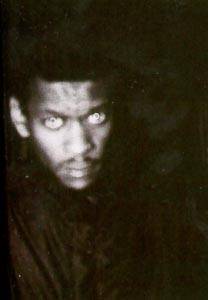 Massive
Attack make Long Dark Night of the Soul Music, a coming-together of funk
and dub reggae, tinged with the attitude that created punk in the 70s.
They've taken all the cool sounds that you love and have re-processed them
for your listening pleasure. They hand-craft their sound without being
masters of any of the traditional musical instruments, working instead
by selecting from the 'riff-bank' they've created over the years. The corporate
money, boosted by enormous worldwide album and ticket sales, is rolling
in. Taken together, all this ought to result in spiritless, mechanical
recordings. It doesn't.
Massive
Attack make Long Dark Night of the Soul Music, a coming-together of funk
and dub reggae, tinged with the attitude that created punk in the 70s.
They've taken all the cool sounds that you love and have re-processed them
for your listening pleasure. They hand-craft their sound without being
masters of any of the traditional musical instruments, working instead
by selecting from the 'riff-bank' they've created over the years. The corporate
money, boosted by enormous worldwide album and ticket sales, is rolling
in. Taken together, all this ought to result in spiritless, mechanical
recordings. It doesn't.








